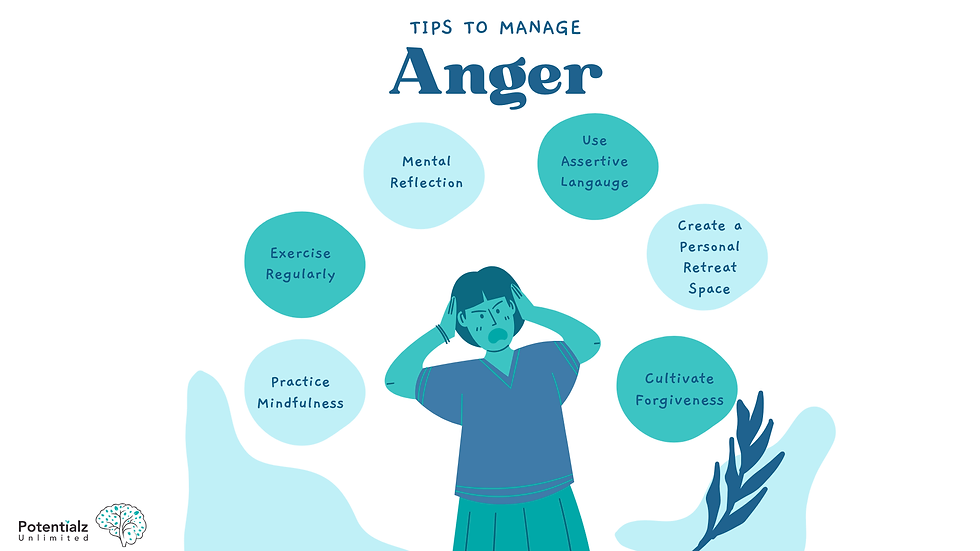How to Manage Anger Constructively
- Gurprit Ganda
- Jun 19, 2024
- 4 min read
Updated: Oct 7, 2024

The Importance of Anger Management
Anger is a natural emotion that can have a significant impact on our relationships, well-being, and overall quality of life (Kabat-Zinn, 2003). Uncontrolled anger can lead to physical health problems, relationship conflicts, career difficulties, and emotional distress (American Psychological Association, 2024). However, controlled anger using constructive anger management techniques can be a throughput for positive changes (Lerner, 1985).

Practical Tips for Managing Anger
1. Engage in Mental Reflection Before Speaking
Take a moment to pause and reflect on your words before speaking. This can help you calm down and choose your words more wisely (Goleman, 1995).
Example: Sarah felt her anger rising when her colleague interrupted her during a meeting. She took a deep breath, counted to ten, and reflected on her words before responding calmly and assertively.
2. Utilize Assertive Language
Express yourself assertively without resorting to confrontation. Use "I language" to convey your message without blaming or attacking others (Alberti & Emmons, 1974).
Example: When Michael's suggestion was ignored in the weekly meeting, he felt offended. However, instead of saying "You always ignore my ideas!", Michael said "I feel undervalued when my suggestions aren't considered. Can we discuss this further?"
3. Engage in Vigorous Exercise
Regular exercise can help reduce stress and anxiety, which can contribute to anger issues (Sharkey, 2016).
Example: After a stressful day of arguments and counter-arguments at court, Emily felt like screaming at someone. Instead, she consciously chose to go for a 30-minute run to release her tension and calm down.

4. Practice Mindfulness
Mindfulness practices such as meditation and deep breathing can help you stay present and focused, reducing feelings of anger and frustration (Hölzel et al., 2011).
Example: David regularly practices mindfulness meditation for 10 minutes each morning to improve his emotional regulation and respond more calmly to challenging situations.
5. Create a Personal Retreat Space
Having a designated space to retreat to can help you calm down and reflect on your emotions (Kondo, 2014).
Example: Rachel has created a peaceful corner in her home with a comfortable chair, plants, and calming music, where she retreats when feeling overwhelmed.
6. Cultivate Forgiveness
Forgiveness is a process that can help you let go of negative emotions and move forward (Cantacuzino, 2016).
Example: After a difficult argument with his brother, Jack took time to reflect on the situation and chose to forgive, allowing them to move forward and improve their relationship.
7. Seek Professional Assistance
If you're struggling to manage your anger, consider seeking help from a mental health professional (American Psychological Association, 2024).
Example: After struggling with anger issues for months, Swahil sought help from a therapist, who provided her with personalized strategies and support to manage her anger.
8. Embrace Humor
Humor can be a great way to diffuse tension and relax, but it's important to use appropriate humor that won't offend others (Martin, 2004).
Example: When a friend accidentally spilled coffee on her shirt, Chutki laughed it off and joked, "Well, I guess I'm having a latte trouble today!"
Note: The examples provided are fictional and for illustrative purposes only. They are meant to demonstrate how each tip can be applied in real-life situations.
Conclusion
As we've explored in this article, anger is a potent emotion that can either hinder or fuel our personal and professional growth. By harnessing the power of constructive anger management techniques, we can transform our relationships, well-being, and overall quality of life for the better. By incorporating practical tips like mental reflection, assertive language, and self-care into our daily lives, we can break free from the shackles of uncontrolled anger and unlock a world of positive change. Remember, mastering anger management is not a one-time feat, but a continuous journey of self-awareness, growth, and empowerment. Start your journey today with Potentialz Unlimited, and discover the transformative power of anger management for yourself.
References
Alberti, R. E., & Emmons, M. L. (1974). Your perfect right: A guide to assertive living. Impact Publishers.
American Psychological Association. (2024). Understanding anger: How psychologists help with anger problems. (n.d.). Retrieved from https://www.apa.org/topics/anger/understanding.
Cantacuzino, M (2016). The forgiveness project: Stories for a Vengeful Age. Jessica Kingsley Publishers. ISBN: Paperback 9781785920004
Goleman, D. (1995). Emotional intelligence: Why it can matter more than IQ. Bantam Books.
Sharkey, J. L. (2016). Exercise and mental health-implications for treatment: A review of the literature. Counseling & Wellness: A Professional Counseling Journal, 5.
Hölzel, B. K., Carmody, J., Vangel, M., Congleton, C., Yerramsetti, S. M., Gard, T., & Lazar, S. W. (2011). Mindfulness practice leads to increases in regional brain gray matter density. Psychiatry Research: Neuroimaging, 191(1), 36–43.
Kabat-Zinn, J. (2003). Mindfulness-based interventions in context: Past, present, and future. Clinical Psychology: Science and Practice, 10(2), 144-156.
Kondo, M. (2014). The life-changing magic of tidying up: The Japanese art of decluttering and organizing. Ten Speed Press.
Lerner, H. G. (1985). The dance of anger: A woman's guide to changing the patterns of intimate relationships. Harper & Row.
Martin, R. A. (2004). The psychology of humor: An integrative approach. Elsevier Academic Press.
Note: The references provided are a selection of the latest research and studies in the field of anger management. They are meant to support the tips and strategies outlined in the article and provide further reading for those interested in exploring the topic in more depth.

Comments